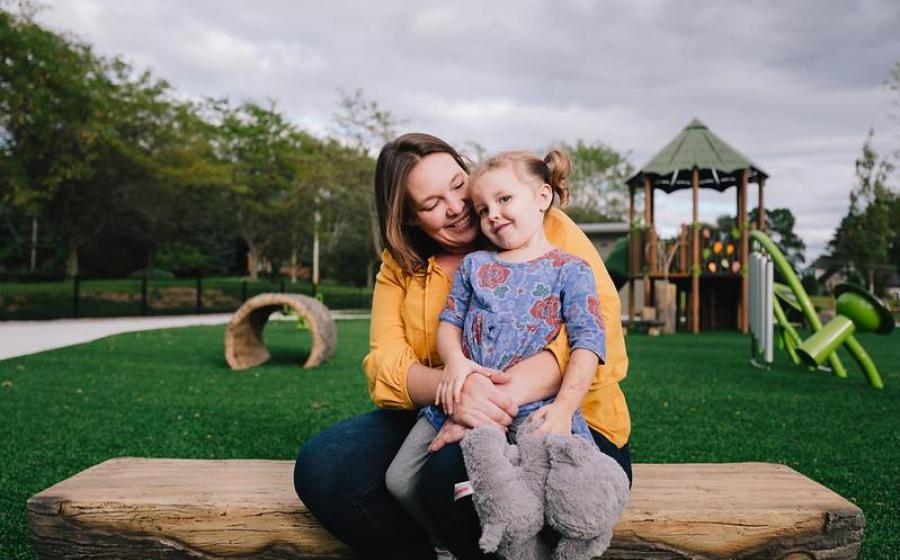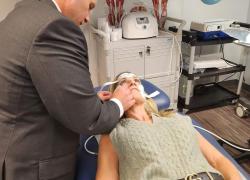2023 CES Las Vegas: Apple's New Technology 5G Modem Not Ready
Warren Buffett's Outlook on Dollar Dominance: Why He Isn't Worried
€1.1mio Research Funding was Awarded to fulfin for its Innovative AI-enabled Credit Scoring for SMEs
New Expo Showcases AI Innovation
(NewsUSA) - Want to learn more about the latest innovations in artificial intelligence?
- Want to learn more about the latest innovations in artificial intelligence?
Don’t miss the first-ever AI Expo for National Competitiveness, which takes place on May 7-8, 2024, in Washington, D.C. at the D.C. Convention Center.
The event, sponsored by the Special Competitive Studies Project, is meant to spark an exchange of ideas and initiatives related to the intersection of AI, emerging technology, and national security.
The AI Expo provides a unique opportunity to spotlight companies and organizations that play critical roles in the ability of the United States to be competitive on a global scale.
“Witness firsthand the groundbreaking technologies poised to maintain U.S. leadership on the world stage,” says SCSP President and CEO Ylli Bajraktari. “Dive into meaningful dialogues with experts and enthusiasts alike, all with a shared vision: to solidify the United States’ position as the leader in critical, emerging technologies.”
The Expo will bring together experts from a range of fields to explore the key areas of AI and emerging technology that impact our national security, economy, and society.
The agenda features more than 300 renown speakers.
SCSP is a nonprofit and nonpartisan initiative with a goal of making recommendations to strengthen America's long-term competitiveness as artificial intelligence and other emerging technologies reshape national security, the economy, and society.
The Expo is free and open to the public, and offers a range of opportunities for sponsors, exhibitors, and participants. This event will not be livestreamed, so be sure to get your ticket!
For more information, visit expo.scsp.ai.
Ensure Extensive Media Coverage for Your Press Release Across the Entire United States - Guaranteed!
Need Auto Glass Repair? Don’t Despair
(NewsUSA) - Everyone with a car needs auto glass repair at some point, but it need not be an expensive or stressful process.
- Everyone with a car needs auto glass repair at some point, but it need not be an expensive or stressful process.
Cracks larger than 10 inches can reduce vision of the road in front of you, greatly reducing road safety. No one plans for auto glass repair, and Auto Glass Now is committed to getting car owners back on the road quickly, on their schedule.
Auto Glass Now, the company known for fast, reliable, and convenient auto glass services, has expanded to more than 200 locations in 35 states.
Auto Glass Now’s local experts are there when you need them, providing reliable auto glass repair and replacement services at reasonable prices, without sacrificing high quality, convenience, or customer satisfaction. Their teams can help provide trusted auto glass repairs, replacements, and ADAS calibrations. “Auto Glass Now is committed to offering unparalleled convenience, value, and customer satisfaction,” says President Nick Ouimet. “
“Auto Glass Now is committed to offering unparalleled convenience, value, and customer satisfaction,” says President Nick Ouimet. “
Auto Glass Now’s key customer offerings that set it apart include same day or next day service, convenient and flexible repair times tailored to each customer’s schedule, and a choice of in-store or mobile repairs. Other benefits include guaranteed price matching, flexible payment options, including buy now/pay later, and acceptance of all insurance.
In addition to these great benefits, Auto Glass Now also offers a Lifetime Warranty against any leaks, molding issues, or defects in the glass. “If our original work requires adjustment or repair, we are happy to repair it at no cost to you as long as you own or lease the vehicle we serviced,” Ouimet says.
Be on the lookout for a new advertising campaign with humorous ads that convey the urgency for customers to schedule their auto glass repairs today: "Auto Glass Now gets you auto glass now!" In addition to the humor, Ouimet says customers should know that “Auto Glass Now is committed to being a leader in the auto glass repair industry..”
As part of the Driven Brands family, Auto Glass Now delivers national scale and efficiency, as well as premier service quality. For more information and to find a service center near you, visit AutoGlassNow.com.
Self-Care and Mental Health Tips for Caregivers
(NewsUSA) - Caregivers, especially parents, often spend so much time focused on the well-being of others, they neglect to take a break for their own mental health. According to KinderCare’s Parent Confidence Index, 51% of parents feel that they never get a break from parenting. As a result, their energy decreases, their emotional tank runs close to empty, and they can struggle to be at their best for their families.
- Caregivers, especially parents, often spend so much time focused on the well-being of others, they neglect to take a break for their own mental health. According to KinderCare’s Parent Confidence Index, 51% of parents feel that they never get a break from parenting. As a result, their energy decreases, their emotional tank runs close to empty, and they can struggle to be at their best for their families.
As caregivers, it’s important to take care of oneself to show up each day and care for the needs of children. Simply put, you can’t pour from an empty cup. Guilt often creeps in for parents when they prioritize their own needs; however, it’s ultimately creating a win-win scenario because doing so teaches children how to keep their own mental health top of mind. May is Mental Health Awareness Month and a great time to start practicing.
Here’s a few tips on how to care for your own mental health amid the parenting frenzy:
- Start small. Simpler habits seem to form faster. Even if it's a few days a week or a few minutes a day, taking the first step of refueling and restoring your energy is a good start. Whether it’s journaling, gratitude recognition, exercising or reading, it’s not about what you choose to do as a reset, it’s more about the intentionality of taking the time to do it.
- Ask for help. Talk with a loved one about your needs and goals. Ask them to not only help remind you to take breaks but encourage you to do so. Accountability can be a fundamental step in ensuring your positive wellbeing as a caregiver.
- Lean into existing resources. Utilize resources around you, such as your child’s child care center by extending their day in care a few days a week for 15-30 minutes. Having peace of mind of knowing that they’re somewhere safe and secure while you take a break is important.
- Set expectations with your children. Share what it will look like for them while you are taking time for yourself. Reassure them you will return to play, read a book or sing silly songs. Explain what they can do, who can help them if needed and when can they expect you back. Express that “this is what I need to help my body and mind feel strong.”
- Be a role model. As any teacher or parent knows, children mimic their caregivers’ behaviors and are in-tune with the attitudes and moods of those surrounding them. In time, they will learn how to take time for themselves by watching you create intentionality around it, and, in turn, will gain confidence in creating those moments for themselves.
For more tips on self-care and mental health for both parents and children, visit KinderCare.com.
Pioneering Fast and Affordable Broadband for the Underserved
(Raoul Lowery Contreras)
- Joe Costello did not expect to be pioneering the next era of internet equity, but this passionate entrepreneur finds himself on the frontlines of the Digital Divide. With his company Kwikbit, Costello, a successful entrepreneur, is empowering underserved and unserved mobile home communities by deploying cutting-edge internet service through a price model infused with empathy. Costello sees a world where everyone has fast, inexpensive internet - he believes that it's a utility and should be treated as such.
Kwikbit is doing its part by expanding its impact on communities large and small, including over 20,000 mobile homes across ten states. By the end of 2024, Costello aims to be on the ground with this 1 gigabit symmetrical internet in over 150 parks, adding 10,000 residents to their service. The company will also receive funds from the California Public Utilities Commission to pilot a program to serve hundreds of unserved mobile homes. Kwikbit and Costello are a testament to what it means to be an entrepreneur in the 21st century.
Early in his career, Costello understood a critical problem with rapidly evolving technology: the fastest and best products first reach the most privileged communities. In the 1990s, mainly the wealthy and tech enthusiasts could access the internet through cable or DSL. As search engines emerged and computers became affordable, more people slowly adopted the technology. Luckily, this broadband could be used and supplied through existing infrastructure. But over the next two decades, through the evolution of the internet from search engines to smartphones, the public caught on to the incredible possibilities of a global online network and demand increased significantly.
The internet story signifies a remarkable transformation. What began as a specialized tool for a select few has become an indispensable part of most people's lives. This shift has had a profound impact, enriching our experiences and propelling society towards greater productivity and efficiency.
The internet's exponential growth, particularly the rise of video-heavy applications, has exposed a critical limitation: speed. The infrastructure that fueled the initial internet boom simply can't handle the demands of today's data-hungry apps.
The current solution pushed by major internet providers is fiber optic cables. Fiber offers the blazing-fast speeds needed for the next generation of internet, through light transmission. However, widespread fiber deployment presents a significant obstacle: the lack of existing fiber optic cables reaching individual homes. Implementing this technology will require massive investments, posing a complex challenge for the future of internet infrastructure.
"Yes, we want to have the fastest fiber cable in every home and business in America. But what people don't realize is that it's going to take decades for fiber to roll out, and they're going to need something else in the meantime," said Costello in a recent interview.
Unfortunately, as fiber optic internet is made available, the wealthy communities are receiving the new capability first. This creates an enormous problem for our country because entire communities, particularly low-income communities, are being left behind.
"You cannot be a functional citizen of the US in the 2020s unless you have high-speed internet," said Costello. "You will fall behind in every way – opportunities, information, finances, civic engagement, healthcare, and education. And your kids will fall behind even more!"
Costello's passion for bridging the digital divide catalyzed the founding of Kwikbit Internet. It started with the development of a new super high-speed wireless technology that can provide the same kind of fast internet service as fiber while being able to be deployed much more quickly and economically. This new wireless technology is called WiGig, or 60 GHz Wi-Fi.
During the pandemic, when many people were suffering from a lack of viable internet, Costello decided that the new technology should be utilized to serve the unserved and underserved. There are many communities that need better internet, but mobile home parks represent one very large group. Kwikbit Internet is 100% focused on providing its high-speed internet to mobile home parks with the goal of letting no mobile home park resident go without this critical new utility. If all mobile home residents lived in one state, it would be the third largest in the country.
Thankfully, the government has been stepping in to help bridge the digital divide in a number of ways. One of the most successful programs has been the Affordable Connectivity Program, or ACP, which partially subsidizes internet bills for more than 20 million low-income households, with more than half of recipients being over 50 years old. Ironically, just as the federal government is funding a new program with $42 Billion to bring fiber to more underserved users, Congress is pulling the plug on the ACP. Ted Cruz (R-TX) is one senator advocating for the ACP's termination, though Texas has the 4th largest number of ACP recipients at 1.67 million households.
As the ACP's fate remains uncertain, the Digital Divide widens.
Fortunately, some states are working to support broadband expansion. The California Public Utilities Commission (CPUC) is using federal funds to build broadband for all, including over $800,000 to Kwikbit for deploying its fixed wireless internet in unserved mobile home parks in Southern California.
From California to Florida, mobile home parks and hard-to-reach communities have a clear need that has only deepened with rising internet costs.
Kwikbit is blazing a trail toward the promise of the internet for all, one community at a time. Closing the Digital Divide takes tenacity. The time for an all-of-the-above broadband investment strategy is now, one that includes wireless gigabit and fiber technology creating a new era of internet access for those who need it most.









